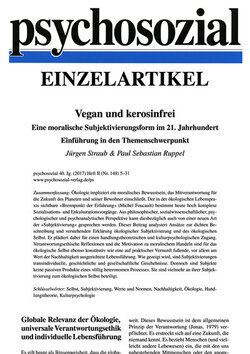27 Seiten, PDF-E-Book
Erschienen: Juni 2017
Bestell-Nr.: 26602
https://doi.org/10.30820/0171-3434-2017-2-5
abonnieren
Jürgen Straub & Paul Sebastian Ruppel
Vegan und kerosinfrei (PDF)
Eine moralische Subjektivierungsform im 21. Jahrhundert
Sofortdownload
Dies ist ein E-Book. Unsere E-Books sind mit einem personalisierten Wasserzeichen versehen,
jedoch frei von weiteren technischen Schutzmaßnahmen (»DRM«).
Erfahren Sie hier mehr zu den Datei-Formaten.
Ökologie impliziert ein moralisches Bewusstsein, das Mitverantwortung für die Zukunft des Planeten und seiner Bewohner einschließt. Der in der ökologischen Lebenspraxis sichtbare »Brennpunkt der Erfahrung« (Michel Foucault) bestimmt heute hoch komplexe Sozialisationsund Enkulturationsvorgänge. Aus philosophischer, sozialwissenschaftlicher, psychologischer und psychoanalytischer Perspektive kann diesbezüglich auch von einer neuen Art der »Subjektivierung« gesprochen werden. Dieser Beitrag analysiert Ansätze zur dichten Beschreibung und verstehenden Erklärung ökologischer Subjektivierung und des ökologischen Selbst. Er plädiert dabei für einen handlungstheoretischen und kulturpsychologischen Zugang. Verantwortungsethische Reflexionen und die Motivation zu moralischem Handeln sind für das ökologische Selbst ebenso konstitutiv wie eine auf praktischer Vernunft fußende, vor allem am Wert der Nachhaltigkeit ausgerichtete Lebensführung. Wie gezeigt wird, sind Subjektivierungen transindividuelle, geschichtliche und gesellschaftliche Geschehnisse. Dennoch sind Subjekte keine passiven Produkte eines völlig heteronomen Prozesses. Sie sind vielmehr an ihrer Subjektivierung zum ökologischen Selbst beteiligt.
Abstract:
The concept of ecology implies a moral consciousness which includes a feeling of shared responsibility for the future of the planet and its inhabitants. The »focal point of experience« (Michel Foucault) visible in an ecological way of life, influences highly complex processes of socialization and enculturation. From philosophical, social scientific, psychological, and psychoanalytic points of view, these processes may be considered as a as a new form of »subjectivation«. This essay analyzes attempts at describing, understanding, and explaining ecology as a form of subjectivation and the ecological self. It proposes an action-theoretical and cultural psychological approach. Reflections on ethics of responsibility, the motivation to act morally, and a lifestyle based on practical reason, oriented especially towards the value of sustainability are constitutive for the ecological self. Here, we suggest that processes of subjectivation are transindividual, historical, and societal occurrences. However, subjects are not passive products of a completely heteronomous process. Rather, they are involved in their subjectivation towards an ecological self.
Abstract:
The concept of ecology implies a moral consciousness which includes a feeling of shared responsibility for the future of the planet and its inhabitants. The »focal point of experience« (Michel Foucault) visible in an ecological way of life, influences highly complex processes of socialization and enculturation. From philosophical, social scientific, psychological, and psychoanalytic points of view, these processes may be considered as a as a new form of »subjectivation«. This essay analyzes attempts at describing, understanding, and explaining ecology as a form of subjectivation and the ecological self. It proposes an action-theoretical and cultural psychological approach. Reflections on ethics of responsibility, the motivation to act morally, and a lifestyle based on practical reason, oriented especially towards the value of sustainability are constitutive for the ecological self. Here, we suggest that processes of subjectivation are transindividual, historical, and societal occurrences. However, subjects are not passive products of a completely heteronomous process. Rather, they are involved in their subjectivation towards an ecological self.
Jürgen Straub & Paul Sebastian Ruppel S. 5–31Vegan und kerosinfrei (PDF)
Eine moralische Subjektivierungsform im 21. JahrhundertRalph SichlerS. 33–47Lebensführung am Leitfaden der Natur (PDF)
Das Beispiel SenecaPascal FrankS. 49–69Warum wir Tiere essen (obwohl wir sie mögen) (PDF)
Sozialpsychologische Erklärungsansätze für das FleischparadoxErika QuabachS. 71–81Vegan: Ideologische und identitätsbildende Aspekte einer Ernährungsweise (PDF)
Dennis Eversberg & Matthias Schmelzer S. 83–100Mehr als Weniger (PDF)
Erste Überlegungen zur Frage nach dem PostwachstumssubjektPaul Sebastian Ruppel & Jürgen Straub S. 101–129Ökologie als Subjektivierungsform und das ökologische Selbst (PDF)
Handlungsund kulturpsychologische Analysen einer kontingenten LebensführungCarsten KavenS. 133–147Wie verändert Norbert Elias’ Konzept von Soziogenese und Psychogenese die Frage nach der Kluft zwischen Umweltbewusstsein und Handeln? (PDF)
Eine moralische Subjektivierungsform im 21. JahrhundertRalph SichlerS. 33–47Lebensführung am Leitfaden der Natur (PDF)
Das Beispiel SenecaPascal FrankS. 49–69Warum wir Tiere essen (obwohl wir sie mögen) (PDF)
Sozialpsychologische Erklärungsansätze für das FleischparadoxErika QuabachS. 71–81Vegan: Ideologische und identitätsbildende Aspekte einer Ernährungsweise (PDF)
Dennis Eversberg & Matthias Schmelzer S. 83–100Mehr als Weniger (PDF)
Erste Überlegungen zur Frage nach dem PostwachstumssubjektPaul Sebastian Ruppel & Jürgen Straub S. 101–129Ökologie als Subjektivierungsform und das ökologische Selbst (PDF)
Handlungsund kulturpsychologische Analysen einer kontingenten LebensführungCarsten KavenS. 133–147Wie verändert Norbert Elias’ Konzept von Soziogenese und Psychogenese die Frage nach der Kluft zwischen Umweltbewusstsein und Handeln? (PDF)

